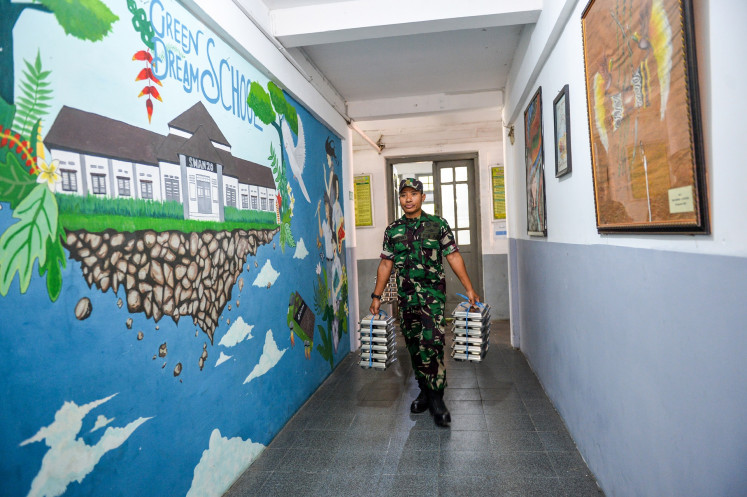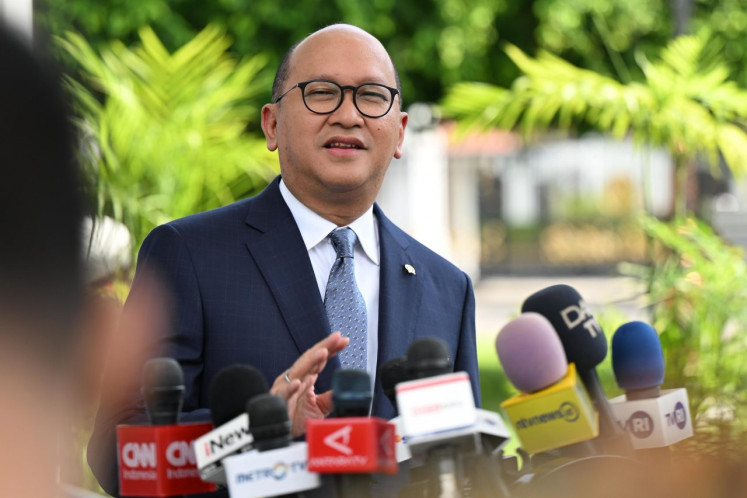Popular Reads
Top Results
Can't find what you're looking for?
View all search resultsPopular Reads
Top Results
Can't find what you're looking for?
View all search resultsSri Mulyani talks taxes with elementary school students
Back to school: Finance Minister Sri Mulyani Indrawati speaks with sixth-graders at SD Kenari 01 state elementary school in Central Jakarta on Monday
Change text size
Gift Premium Articles
to Anyone
B
ack to school: Finance Minister Sri Mulyani Indrawati speaks with sixth-graders at SD Kenari 01 state elementary school in Central Jakarta on Monday. Among other things, she told the students about her role as a finance minister and the importance of paying taxes for the country’s development.(JP/Eisya Eloksari)
Low tax awareness is one of the reasons why tax payment in Indonesia remains among the lowest in Southeast Asia as many people still do not consider it a civic duty.
Promoting tax awareness takes a long time as it is part of an educational process that should start at an early age.
Finance Minister Sri Mulyani Indrawati visited Kenari 01 state elementary school in Central Jakarta on Nov. 4 to speak to sixth grade students about the importance of taxes for building schools, hospitals and other public facilities as part of the Finance Ministry Teach program to improve tax awareness across the country.
She also led a role-playing game in which the children took on the roles of ministers. A taxation director general was appointed to collect taxes from her classmates and report to the finance minister, who had to then distribute the funds to other “departments” for their proposed projects.
"I didn’t get enough money. I need to build another hospital," said a student-turned-health minister.
The finance minister looked confused and then decided to collect another round of taxes from his peers, so the ministries would have enough money for their programs.
"Was it easy deciding to whom the money should go?" Sri Mulyani asked the student who had taken on her role as finance minister.
He answered with a shake of his head.
She also asked the students whether paying taxes was fair. One student answered that it was not because that meant the government had to cut people’s salaries. His classmates shouted in disagreement, arguing that collecting taxes was necessary.
"They all said that paying taxes was for the collective good; I think that’s an important message to learn," she told the press after her classroom visit.
Meanwhile, Kenari 01 headmaster Lombardini said the students had enjoyed the session and "responded really well" to the ministry's role-playing exercise.
"I hope the students gained knowledge about how the country manages its finances," she said.
Kenari 01 has 945 students and 35 classrooms; each received a visit from a Finance Ministry representative.
The Finance Ministry Teach program is now in its fourth year. This year, it was held simultaneously in 159 elementary schools across 29 provinces, with some 3,700 Finance Ministry employees teaching 47,794 students. The program reached 58,799 students in 174 schools across 34 provinces last year.
Indonesian Teachers Association chairman Muhammad Ramli Rahim, however, said that tax education for elementary school was too early and "not yet necessary".
He went on to say that tax education would be better suited to high school students.
"I think it is better if elementary school students are given lessons on financial management and saving instead," he told The Jakarta Post over the phone on Friday.
He added that the program could be beneficial if the students told their parents to pay income tax.
Meanwhile, tax expert Bawono Kristiaji approved of the Finance Ministry Teach program, saying it should be continued to ensure sustainable tax revenue.
"Indonesia has only just started systematic efforts to build a tax society in the last four years and one way to do it is through tax education," he said.
He added that the country had carried out similar tax education initiatives in the past, such as the Taxation Directorate General’s Pajak Bertutur (Tax Talk) program aimed at vocational high school students.
"The ministry must carry out this program [Finance Ministry Teach] consistently and I believe that it can increase tax compliance in the long run.”
According to the Taxation Directorate General, Indonesia’s tax-to-gross-domestic-product ratio was only 11.5 percent, the lowest in the ASEAN region, with Thailand topping the list at 17.6 percent last year.
Some 16.3 million people, or 65.4 percent of registered taxpayers, contributed around 10 percent of the country’s tax revenue in 2018.
According to Finance Ministry data, the government raised Rp 801.16 trillion (US$57.14 billion) in tax revenue from January to August this year, only a 0.21 percent increase from the same period in 2018.
In its first-half report, the government projected tax revenue to reach Rp 1.4 quadrillion this year, lower than the initial target of Rp 1.57 quadrillion as planned in the 2019 state budget.










